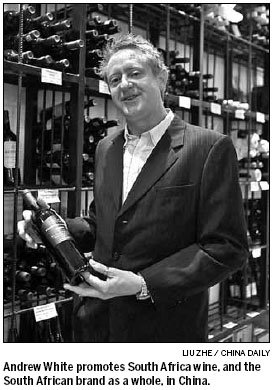New territory shows grape promise for wine travelers
Updated: 2013-12-29 08:19
By Bob Wekesa(China Daily)
|
|||||||||
It's an enviable situation for a restaurant to be in when opinion is divided as to whether it is the cuisine or the wine that is the main draw. Andrew White, the sommelier at Pinotage, says it is a combination of "good wine, good meals, good company and good environment" that have popularized the South African restaurant over its six years in Beijing.
White, who took charge of the wine side of things this year, has no doubt about his role on Beijing's wine circuit. "I am here to promote South African wine and along with it the South African brand as a whole," he says.
In doing so, he has devised a strategy where wine tasting is done at Pinotage's two restaurants - in the busy expat district of Sanlitun and on the outskirts of the city in Shunyi - deliveries are made to homes, and events are organized.
"We have old vintage red wines that come in ready for enjoying, as opposed to wines from other parts of the world that one has to wait for to mature," he says.
Pinotage has a supply line from more than 350 South African wineries and sells wine from 40 yuan ($6.60) to 1,200 yuan a bottle.
"I learned about wine and food early on as a child growing up in Cape Town," says the widely traveled White. "I come from a diverse background with my dad being of Scottish background and my mom of Dutch heritage."

After finishing his hotel management course in Cape Town, he trained in the same discipline in London in the late 1990s. After graduating, he traveled back to South Africa briefly, backpacked in Ecuador, and accompanied his father on trips to Brazil and Bolivia.
On his return to the United Kingdom, White found that the property industry seemed to hold much more promise than gastronomy and went into selling mortgages. But when the global financial crisis hit in 2008, it was time for him to hit the road again, this time to Argentina.
Eventually, he returned to South Africa and the restaurant business. He worked at the Jordan restaurant in Cape Town, which was named the third-best restaurant in South Africa at the time.
Life in South Africa was much slower than in London, but in such a laissez-faire environment, the energetic White could thrive.
"I went to Vinimark Wines as a wine representative, basically selling wine in various parts of South Africa. I represented about 45 wine farms," he says.
After two years of this, he took up a friend's invitation to try Dubai for work but soon decided he "wouldn't survive 50 C temperatures for long".
Back in South Africa, he was mulling over his next outbound move when a friend suggested Beijing.
"I didn't have to think too hard about the offer. China is a fledgling wine-drinking country like South Africa, as discerning people embrace wine culture and turn away from beer and brandy," he says.
Not surprisingly, White big-notes the tradition of South African winemaking compared with other countries.
"We have 350 years' history of winemaking. When we started out, Bordeaux was still a swamp."
He is less charitable, however, about his own country when it comes to food culture.
"A good restaurant's popularity in Cape Town lasts on average two years and then people move on to the next best thing in town. The one unifying phenomenon in South Africa is braai or barbecue.
"Thanks to the year-round Mediterranean-like weather, it means one can make a fire outside and throw a steak down, have a beer or wine while waiting for the meat to cook and socialize with friends and family."
As for Chinese food, White says its diversity is due to the vastness of the country, with each region providing a different taste.
sundayed@chinadaily.com.cn
(China Daily 12/29/2013 page5)